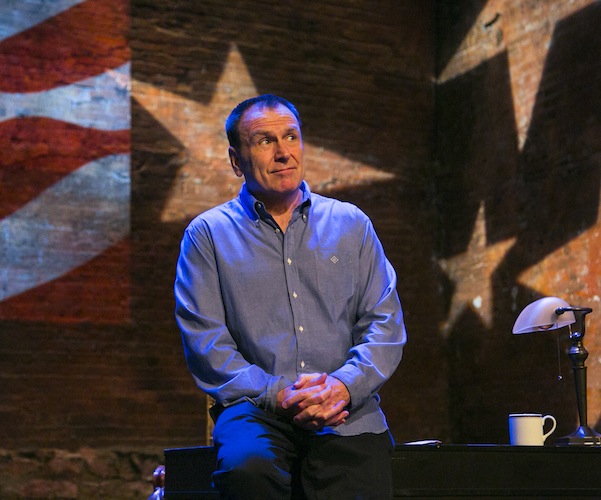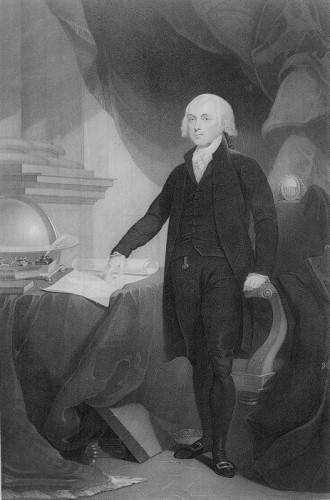Theater Review: Colin Quinn’s Sharp and Funny “Unconstitutional”
Stand-up comic Colin Quinn has been giving a lot of thought to the Founding Fathers, their vision for the new nation and, well, how that turned out. The result is his sharp and funny one-man show.
By Betsy Sherman
As a day job, I work for a website that compiles data about elections that took place in the early years of the United States (A New Nation Votes), so I’m often looking scans of newspapers from the late 18th and early 19th centuries. Aside from admiring the intricacy of the typesetting and the down-comforter denseness of the literary style, I try to notice ways in which the inhabitants of the young republic were like us and ways in which they were not. When it comes to politics, the optimism and idealism of the turn of the century feels, sadly, quaint and foreign. But once the two-party system gains traction in the buildup towards the War of 1812, and partisans start calling themselves true patriots and their opponents the powdered-wig equivalent of scumbag, I feel right at home.
Stand-up comic Colin Quinn has been giving a lot of thought to the Founders, their vision for the new nation and, well, how that turned out. The result is his sharp and funny one-man show Unconstitutional, which he performed at the Paramount Theatre on November 19 as part of his Thirteen Colonies Tour, which as of now runs through May, 2014 in a number of American cities.
I first saw this raspy-voiced son of Brooklyn scorch the walls of the short-lived Catch a Rising Star in Harvard Square, when he opened for Jake Johannsen in maybe 1988. Then, as now, Quinn had a knack for hilariously boiling down the stuff of everyday life to a common denominator of basic, if not base, human behavior. In the ensuing years, Quinn has been most visible as a cast member of Saturday Night Live during the ‘90s and as host of the superb Comedy Central show Tough Crowd, in which he and other comedians dissected the issues of the day with brutal frankness.
Unconstitutional is the follow-up to Quinn’s successful Long Story Short, which took on the history of civilization (after a run on Broadway, the show was taped as an HBO special). For this one, Quinn ponders the ramifications of a document that, as he says, everybody thinks they know—when they’re drunk, and they think someone’s trying to step on their rights. Darting back and forth in time from the 1780s to the present, with noteworthy points in between, he pulls back the curtain to show that our Founding Wizards were, if not puny (well, James Madison was very short), then for the most part, as human as we are. Despite the ruefulness in the line “We almost pulled off four pages written on a napkin in a bar in 1787,” Quinn puts across a genuine respect for the men who created a system that could keep us Americans more or less in line for so long.
As he reconstructs and demystifies the Constitutional Convention, Quinn shrugs, asking us to cut a break for the delegates, most of whom were in over their heads. He notes that Madison waited to convene the event until big shots John Adams and Thomas Jefferson were in Europe—and likens him to George Harrison, sick of John and Paul hogging all the album tracks. The preamble alone, Quinn contends, proves that these guys “drank like beasts”: the demented idea of a “more perfect union” is followed by the delusion of “domestic tranquility” (you can find this kind of inspired riffing on the Twitter feed @iamcolinquinn, where occasionally chunks of Goodfellas dialogue will be attributed to Founding Fathers or Jesus and his apostles).
Brandishing a roll of parchment and backed up by a screen that shows excerpts, Quinn considers what the Constitution hath wrought, from the time of its ratification up to the present. The judicial branch is the bartender of the country: bartenders “used to settle arguments, before Google.” Congress (who really deserved more discussion in the show) tries to bamboozle us into thinking they’re working for us. And our presidents have often been psychotic (not so our current, who “has to sneak cigarettes like a teenage girl”). In my favorite line of the show, Quinn nails American imperialism–“We’re a pushy country and we don’t always read the room”—in a way that’s damning but also a little bit empathetic.
Just like in Quinn’s stand-up, the speed can get pretty breakneck. His style includes sotto voce afterthoughts that might get lost in the torrent, or might sink in a minute or two later—in either case, the density is well worth it (I thought he mentioned an Al Fedoosh, then realized he had said “every state has its alpha douche”). Little treats pop up, such as the compromise over slavery being related in the voice of Vito Corleone appeasing his fellow dons.
“This country is about to get divorced” is the show’s opening line. And although the second amendment is the one that’s “gonna break us up,” it’s clear from Quinn’s entire body of work that he’s most concerned with the first amendment and its promise of freedom of speech. He has railed against the recent oversensitivity to offensive language (and by this he doesn’t mean cursing). “People are walkin’ around with twitches from not being able to speak” about issues such as race and ethnicity, he says. We, like the new Americans, have got to look at the big picture, and that will require talking about our differences. Quinn is one of the few who has (to milk my Oz reference) da noyv to do it.
Betsy Sherman has written about movies, old and new, for The Boston Globe, The Boston Phoenix, and The Improper Bostonian, among others. She holds a degree in Archives Management from Simmons Graduate School of Library and Information Science. When she grows up, she wants to be Barbara Stanwyck.



